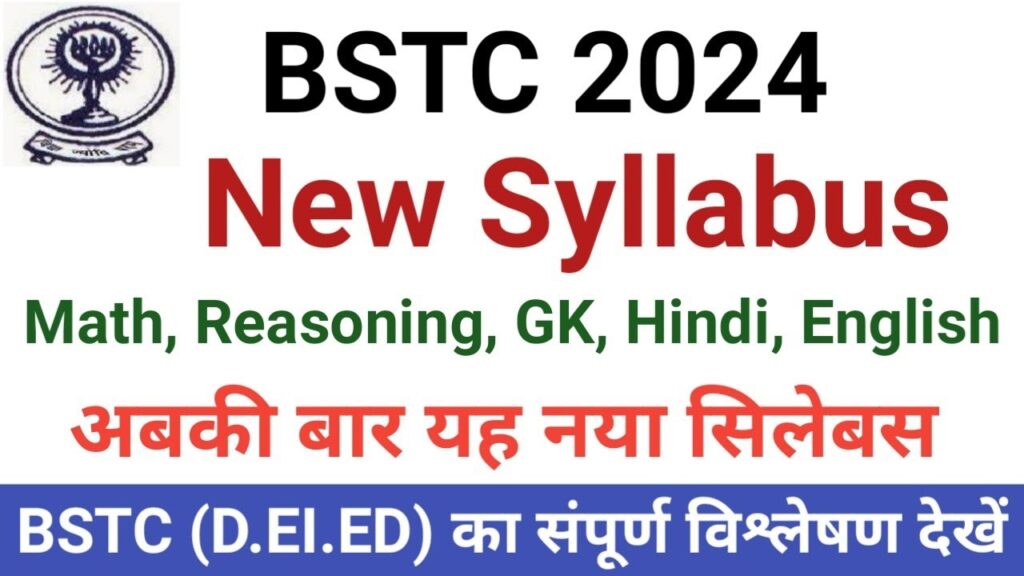Vardhman Mahaveer Open University (VMOU), Kota, is set to conduct the Pre Basic School Training Certificate (BSTC) Examination for 2024. This guide provides an in-depth look at the BSTC syllabus and exam pattern to help candidates prepare effectively.

Rajasthan BSTC Syllabus 2024
The Rajasthan BSTC Examination is an entrance test for the Pre D.El.Ed. program, a prerequisite for basic school teaching certification in Rajasthan. This year, the exam will be organized by VMOU, Kota. Candidates need to be well-versed with the syllabus to secure their place in the program.
Key Details:
- Exam Name: Rajasthan Pre Basic School Training Certificates (BSTC)
- Exam Body: Vardhman Mahaveer Open University, Kota (VMOU)
- Courses Type: Pre D.El.Ed (BSTC)
- Location: Rajasthan
- Total Questions: 200
- Total Marks: 600
- Official Website: predeledraj2024.in
Detailed BSTC Exam Pattern 2024
The BSTC exam is structured to evaluate candidates across multiple competencies. The exam duration is three hours, during which candidates must answer 200 multiple-choice questions (MCQs). The total score for the exam is 600 marks, with each question carrying 3 marks. There is no negative marking for incorrect answers.
Subject-wise Breakdown:
- General Knowledge (GK): 50 questions, 150 marks
- Mental Ability: 50 questions, 150 marks
- Teaching Aptitude: 50 questions, 150 marks
- Language Ability:
- Sanskrit or Hindi: 30 questions, 90 marks
- English: 20 questions, 60 marks
Exam Features:
- Objective Type Questions: The exam comprises MCQs.
- Bilingual Paper: The question paper will be available in both English and Hindi.
- Four Sections: The exam is divided into four sections, each containing 50 questions, except the language ability section which is split between English (20 questions) and either Hindi or Sanskrit (30 questions).
- Total Duration: The exam duration is 3 hours.
- No Negative Marking: Candidates will not lose marks for incorrect answers.
BSTC Syllabus 2024
The BSTC syllabus encompasses four main areas: Mental Ability, General Awareness of Rajasthan, Teaching Aptitude, and Language Ability (including English, Sanskrit, and Hindi).
1. General Awareness Syllabus:
- Historical Aspect: Important historical events and figures in Rajasthan.
- Political Aspect: Government and political movements in Rajasthan.
- Art, Culture, and Literature: Regional art forms, literature, and cultural practices.
- Economic Aspect: Economic development and key industries in Rajasthan.
- Geographical Aspect: Geography of Rajasthan, including physical features and resources.
- Social Aspects: Social customs, traditions, and lifestyle.
- Tourism: Major tourist attractions and heritage sites in Rajasthan.
2. Mental Ability Syllabus:
- Analogy: Identifying relationships between pairs of items.
- Discrimination: Distinguishing between different concepts or items.
- Relationship: Understanding relationships between different elements.
- Analysis: Analyzing information to draw conclusions.
- Logical Thinking: Applying logic to solve problems and make decisions.
3. Teaching Aptitude Syllabus:
- Teaching Learning Leadership Quality: Skills required for effective teaching and leadership in educational settings.
- Creativity: Encouraging creative thinking and problem-solving.
- Continuous and Comprehensive Evaluation: Understanding and implementing continuous assessment techniques.
- Communication Skills: Effective communication strategies for the classroom.
- Professional Attitude: Professionalism in teaching.
- Social Sensitivity: Awareness of social issues and sensitivity to students’ needs.
4. Language Ability Syllabus:
Candidates must demonstrate proficiency in English, and either Sanskrit or Hindi.
English Syllabus:
- Comprehension: Reading and understanding passages.
- Spotting Errors: Identifying grammatical errors in sentences.
- Narration: Direct and indirect speech.
- Prepositions: Correct usage of prepositions.
- Articles: Use of articles in sentences.
- Connectives: Conjunctions and their usage.
- Sentence Correction: Correcting sentence structure.
- Kinds of Sentences: Types and purposes of sentences.
- Sentence Completion: Completing sentences meaningfully.
- Tense: Usage of different tenses.
- Vocabulary: Synonyms, antonyms, one-word substitutions, and spelling errors.
Sanskrit Syllabus:
- वर्ण विचार (Phonetics): Study of sounds in Sanskrit.
- शब्द रूप (Word Forms): Different forms of words.
- धातु रूप (Verb Forms): Conjugation of verbs.
- उपसर्ग (Prefixes): Usage of prefixes.
- प्रत्यय (Suffixes): Usage of suffixes.
- सन्धि (Sandhi): Rules of sound combination.
- समास (Compound Formation): Formation of compound words.
- लिंग एवं वचन (Gender and Number): Gender and number in nouns.
- विभक्तियाँ (Case Endings): Case endings and their usage.
- कारक ज्ञान (Knowledge of Cases): Understanding the grammatical cases.
Hindi Syllabus:
- पर्यायवाची शब्द (Synonyms): Synonymous words.
- विलोम शब्द (Antonyms): Antonyms.
- युग्म शब्द (Pair of Words): Related word pairs.
- वाक्य विचार (Sentence Analysis): Analysis of sentence structure.
- शुद्धिकरण (Correction): Correction of words and sentences.
- मुहावरे एवं कहावतें (Idioms and Proverbs): Common idioms and proverbs.
- सन्धि (Sound Combination): Sound combination rules.
- समास (Compound Words): Formation of compound words.
- उपसर्ग (Prefixes): Usage of prefixes.
- प्रत्यय (Suffixes): Usage of suffixes.
- वाक्यांश के लिए सार्थक शब्द (Meaningful Words for Phrases): Meaningful words for given phrases.
Downloading BSTC Syllabus PDF
Candidates can download the detailed BSTC syllabus in PDF format from the official website of Rajasthan BSTC or through the direct links provided. The syllabus is available in Hindi and covers all the essential topics for the exam.
Download Links:
FAQs
Q1: What does the BSTC syllabus include?
The BSTC syllabus includes Rajasthan General Knowledge, Mental Ability, Teaching Aptitude, and Language Ability (Sanskrit/Hindi).
Q2: How many languages are included in the BSTC syllabus?
The syllabus includes three languages: Hindi, English, and Sanskrit. Candidates must choose one of these languages along with English.
Q3: Has the syllabus changed with the renaming to Pre D.El.Ed?
No, the syllabus and exam pattern remain the same despite the name change to Pre D.El.Ed.
Q4: How many questions are there in the BSTC exam?
The exam consists of 200 MCQs divided into four sections, with each section containing 50 questions.
Q5: How many questions from Mental Ability are included in the BSTC exam?
There are 50 questions from the Mental Ability section in the BSTC exam.
Q6: Is there negative marking in the BSTC exam?
No, there is no negative marking for incorrect answers.
The BSTC syllabus and exam pattern provide a comprehensive roadmap for candidates preparing for the exam. Understanding the detailed breakdown of topics and practicing with previous year papers can significantly enhance a candidate’s chances of success in the Rajasthan Pre D.El.Ed examination.
